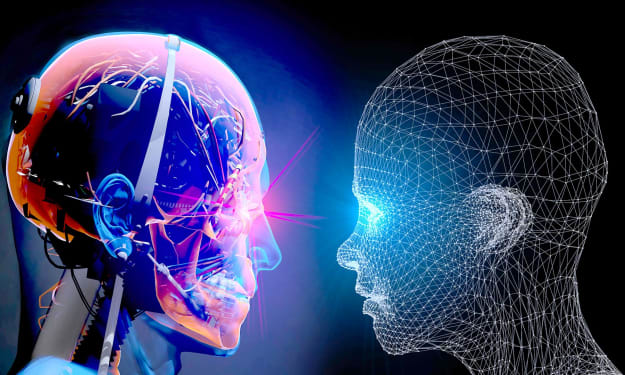Autism Awareness Month
Brace Yourselves, Ableism Is Coming...

March is drawing to a close, and I'm frantically preparing for Rowany Festival, an annual Medieval Reenactment event that has been cancelled the last two years due to the pandemic, and Camp NaNoWriMo.
I'm also bracing myself, because April is Autism Awareness Month. Though it's undergoing a push toward 'Autism Acceptance' in recent years, there is still a long way to go before we gain general social awareness or acceptance. Ultimately, it's still a month where people who don't actually know the first thing about Autistic people put a blue frame on their Facebook Profile or sell puzzle-piece t-shirts and other merchandise.
For me, that's a month of the same people who complain that I don't put more effort into socialising with co-workers during my breaks unironically sharing articles about social exhaustion and the importance of not pressuring Autistic people when they are feeling overwhelmed.
It's a month of baffled "but you don't look Autistic?" responses when I fail to impersonate a non-verbal child, or the speaker's personal experiences with the single Autistic person they know, or don't match up with stereotypes of Savant Autistic adults as shown on Sit-Coms or TV Dramas.
It's sitting through "Autism Awareness" mandatory training for a Disability Suport Organisation, and interrupting every five minutes to correct information that is out-dated, out of context, or just plain wrong. The person giving the lecture makes a big deal about their Autistic nephew, holding him up as the example of what Autism looks like: white, male, non-independant. Pitiable, yet so inspirational because he managed to make a friend and go to school.
The same lecturer tells me to stop talking when I point out that Autism is a spectrum, not a stereotype.
TW: Ableism, demonisation of Autistic people, low-key Eugenics.
Autism Awareness Month is a month of struggling with the conflicting knowledge of how much early intervention or educational supports would have helped me growing up, and the knowledge that those supports weren't available when I was younger, or wouldn't have been available to me, because I masked too well.
I could attend school and do classwork, but by the time I returned home after two hours of public transport and six hours of enforced close contact with hundreds of loud, noisy teenagers, I had no energy left for homework or revision. I'd arrive home, strip off my hot, itchy uniform, and shut myself in my room, in the hopes of recovering enough to be able to talk to my family over dinner.
Of course, the next day I'd be called up in front of the class and grilled over why I hadn't completed three hours of homework, because social shaming makes everything better and in no way contributed to me going non-verbal under pressure...
IEPs, Individualised Education Plans, didn't become standard practice until 2006, three years after I left high school for an apprenticeship. Before that, they didn't exist for anyone without at least two learning disabilities or medical conditions severe enough to impact their ability to undergo mainstream schooling. Someone like me, clearly struggling but masking enough to appear normal? Obviously I was just a lazy student who needed to try harder and apply myself...
An IEP that didn't penalise me for non-completed homework, or allowed a tutor to help with assignments, would have turned my academic life around... but like so many other Autistic girls in the 80s, 90s and 00s, I fell through the cracks.
(My parents had to take on the Department of Education in a Supreme Court case to allow my learning-impaired twin sister to be enrolled in public school, and keep her classroom aide in the early 90s. Sally was WAY more obviously disabled than I was, had severe dysgraphia and learning delays, and it still almost wasn't enough to get support. Sally was accepted into a Special Needs class in high school, and put on a disability pension when she turned 18, with grand plans to work as a lunch lady so she wouldn't earn so much that she lost that financial support.)
Even now, I struggle to get support, because I can usually pass as neuro-typical. I learned ways to work around obstacles, so I could do most of what a neurotypical adult does, and conceal just how much energy and effort it takes. I learned to mimic social behaviours; the wide smile and excited tone at seeing a person, the demure attentiveness desirable in the workplace, educated guesses at what kind of response a person is looking for when they ask a question.
Most days, I can just about cope, as long as I have the opportunity to sit down with some calming music and my latest embroidery project afterward before I give myself an early night. Some days, when I've been dealing with non-stop sensory overwhelm and being berated to just do a better job and no opportunity to stop and decompress... it's not great.
The longest I've stayed in a single job was roughly 4 years and 9 months, (and a big part of the last nine months was that we were in a Pandemic). At about the 2.5 year mark, my abled, neurotypical co-workers complain about my lack of socialising during breaks or a missed social cue. Rather than telling me directly, as I've requested, they complain to managers and HR, and my next performance review will involve a manager telling me that my breaks are to be used as enforced social time, or that I need to pay more attention and work out when people are joking.
Oh, and stop sending management an email every time someone uses degrading/racist/sexist language. We don't have time for any of that...
Which is about the time I start spending my downtime job hunting.

Autism is a spectrum, but not one that runs from 'mild' to 'severe', or even from 'independant' to '24/7/365 care needs'.
Instead, think of it like a soundboard.
There's one knob for executive function, one for energy output and recharge time, one for the amount of sensory input they can handle.
There's a dial for how much they can focus on things that don't interest them, and one for social interaction. There's a floating scale for meltdown triggers, and another for Autistic Burnout.
Every Autistic person has their 'soundboard' on different settings.
One might come off as a social butterfly, because they can only handle large numbers of people by talking in a small group for five minutes and then wandering aimlessly for a bit before settling on another small group.
Another can handle a night out at a Rock Concert, but won't emerge from their room for two days after, because they have to get their sensory input meter back into whack.
Another might spend a night out drifting in the wake of an extroverted friend, letting them take the brunt of social interaction. Some may set timers on their phone, allowing them an excuse to step outside for a fake phone call.
We all have different limits and different coping methods. What works for one may not work for others.

The great rallying cry for marginalised people is "Nothing about us, without us!"
Yet, from the "discovery" of Autism in 1905 (before that, we were Changelings or Village Idiots or Asylum inmates) up until the last few years, most of the mainstream narriative has been non-Autistic people making descisions on our behalf, without our input.
All of the early studies were done on young boys who struggled with social interaction, leading to massive under-diagnosis of women and girls even today. My parents knew I was autistic from a young age, but no therapist would diagnose me, because 'Autism is a boys' disease'.
Hans Asperger's work on "Little Genius" Special Interest Savants spared hundreds of Autistic boys from Hitler's gas chambers in Nazi-occupied Europe, but did nothing to stop non-Savants from being killed, and had very little impact on stopping Autistic people across the world from being medically sterilized, experimented upon, or locked up. The main accomplishment of his research was to divide Autistic people into "good" and "bad".
"Good" Autistics could pass for normal, and usually had Savant tendencies that could be exploited under the right circumstances, allowing the shameful Autism to be hidden under the mantle of "Gifted and Talented".
"Bad" Autistics were the ones who couldn't pass, non-verbal children who became uncommunicative adults, who had meltdowns after sensory overload, who were framed as a burden on their family and Society.
In 2020, singer/songwriter Sia directed and produced a movie, "Music", which she claimed was the product of years of research, designed to uplift Autistic people. If that was actually the intention, and not just the official line to dodge the flood of backlash... then wow, I didn't know it was actually even possible to fail that hard.
"Music" did invite a lot of mainstream discourse, as the backlash was loud enough that reporters actually bothered to ask for input from #ActuallyAutistic self-advocates, and boy did they deliver in spades!
From the sensory hell that was the dance sequences, to the problems with casting a neurotypical non-disabled actress to play the titular character, to the stereotyical-verging-on-mocking portrayal, to the harmful and illegal restraint techniques, to the actual main character being Music's half-sister-turned-very-reluctant-caregiver Zu, to the fact that Sia's "years of research" were sourced purely from Autism Speaks, who went to the trouble of issuing a public statement disassociating themselves...
Seriously, you know you've fucked up when a Eugenics-based organisation largely viewed as an Autistic Hate Group claims that they had nothing to do with you.
So, What Can You Do To Be An Ally This April?
- Avoid anything to do with Autism Speaks. The majority of their funding goes toward marketing and events for doners, or to searching for a "cure". Almost none goes to supporting Autistic people, directly or indirectly.
- Do your research. Organisations like Autistic Not Weird and Autistic Self-Advocacy Network highlight the voices of #ActuallyAutistic adults, who - surprise surprise - don't vanish off the face of the earth once they stop being children at the magic age of 18.
- If you can afford it, donate to charities that benefit Autistic people. Buy books and watch movies by Autistic creatives. Read articles that come from lived experiences, not media stereotypes.
- Remember that, for a lot of Autistic people, the spotlight is not a fun place to be. In fact, most of us have trauma relating to childhood bullying, where being the centre of attention frequently led to us being the punchline of a joke at our expense. If you're going to put attention on an Autistic friend or co-worker, talk to them first to see what they are comfortable with.
If you've met one person with Autism, then you've met one person with Autism.
My Beloved was also recently diagnosed, because ADHD and Autism can share a lot of diagnostic traits, especially when presenting in women and girls. Some of our quirks are similar, and some are not. I have a shorter bouce-back time, and my love is better at pushing through executive dysfunction. She uses phone alerts to remind her of daily tasks, while I have to remind myself of scheduled events.
This April, don't just be aware; be accepting.
And don't be a jerk.
If you liked this story, leave a heart or a tip, and follow me on Vocal and Medium!
About the Creator
Natasja Rose
I've been writing since I learned how, but those have been lost and will never see daylight (I hope).
I'm an Indie Author, with 30+ books published.
I live in Sydney, Australia
Reader insights
Outstanding
Excellent work. Looking forward to reading more!
Top insights
Easy to read and follow
Well-structured & engaging content
On-point and relevant
Writing reflected the title & theme
Excellent storytelling
Original narrative & well developed characters
Expert insights and opinions
Arguments were carefully researched and presented
Heartfelt and relatable
The story invoked strong personal emotions






Comments (1)
Your article is enlightening. I admit that the first time I heard about autism was years ago with the movie Rayn man and I was impressed because they were talking about an adult and not a child. Then in the last few years I've discovered that autism is a spectrum and there are a lot of independent people that are on that, I had no idea. As for marketing I agree, too often disabilities or differences are exploited to get attention and visibility, by people who have nothing or little to do with it. Thank you for sharing such precious information. ❤